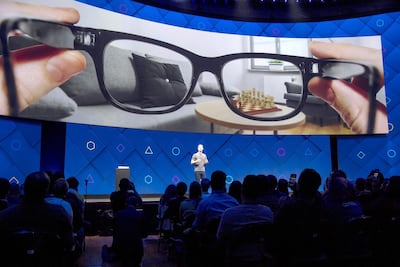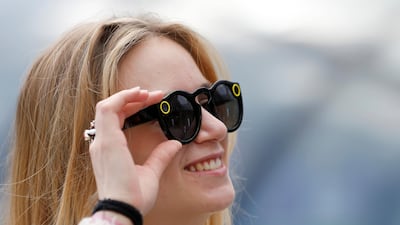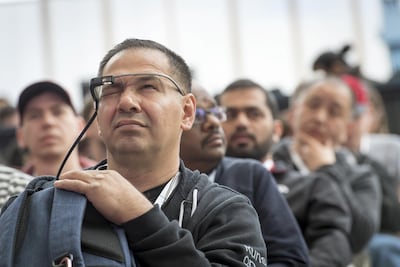The number of people in the world who wear spectacles is estimated to be about two billion. That's a lot of pairs of glasses. Facebook, however, believes it's only a matter of time until we're all wearing them – and not to correct our eyesight, but to interact with a new era of information.
Last week it was reported that the social media monolith is stepping up its efforts to manufacture a pair of smart spectacles, code-named Orion, which it hopes to launch at some point before the year 2025. Moreover, the company sees Orion as the ultimate replacement for that ubiquitous gadget, the smartphone. So integral have mobile phones become to our everyday lives that it seems almost impossible to conceive of a world without them.
But Facebook is banking on us wanting information to be literally balanced on our noses, and anticipates us experiencing that desire in as little as five years from now. The market for smartphones is saturated, not only in the UAE but in all high-income economies. Reports of sluggish worldwide sales have become commonplace, but this doesn’t mean we’re using them any less – it’s more a sign that they’re lasting longer and we’re resisting the temptation to upgrade them. But that slowdown has an effect on the innovation process, says technology analyst Paolo Pescatore.

“Consumer electronics providers are struggling to differentiate,” he says. “Therefore, they are all looking to new categories to drive innovation and ultimately generate new sources of revenue. Smart glasses is an interesting category as it opens up new use cases for all customer segments.”
Facebook's interest in ocular technology is long-standing. One of its chief scientists, Michael Abrash, has described smart spectacles as "one of the great transformational technologies of the next 50 years", and last week's rumours about Orion included further details about its functionality: it would take calls, live-stream our location to our contacts on social media and display information within our field of vision. But Facebook's hunch is shared by many in the industry. Randall Stephenson, chief executive of US telecommunications firm AT&T, gave a speech earlier this year in which he envisioned a time when smartphones ultimately give way to spectacles.
"We carry around these devices and they're bigger than they should be," he said. "I say they go away. It's conceivable that we're going to be moving into a world without screens, a world where this is your screen," he added, pointing to the glasses he was wearing. The elephant in the room, however, is that smart spectacles have thus far been of little interest to consumers. Any discussion about the potential of this technology inevitably includes references to Google's smart spectacles, Google Glass, which were launched to much fanfare but were ultimately banned from workplaces, bars and cinemas as they became synonymous with privacy invasion.
With Google having discontinued sales to consumers in 2015, and Snapchat’s attempt at smart spectacles also having foundered, there seemed to be a consensus that the technology wasn’t ready, and consumers weren’t ready for it, either. But there appears to be a growing sense that Google Glass was ahead of its time, and smart spectacles could yet become a transformative technology. For some, including Steve Ranger, editor of the website TechRepublic, there’s an inevitability that we’re heading in that direction.
“I just don’t see a next evolution of personal technology that doesn’t involve some sort of overlay on our vision,” he wrote. After all, the smartphones we consult every hour of every day are merely miniaturised versions of the desktop and laptop computers that preceded them. In this sense, they almost look quaint. And what use is a smartphone if you can’t read text, watch films and call your friends on a screen that magically appears before your eyes?
Not all information has to come from a screen, however. The growing capability of virtual assistants such as Alexa, Siri and Cortana is bringing us more information via disembodied voices that don’t necessarily emerge from smartphones. Shopping, checking the weather, booking tickets, asking for directions, following the news or even making phone calls can be done without any visual reference, and as they get better at returning information and running errands, we’ll become less and less tethered to screens. Equally, the growth of virtual assistants that understand our voices will ultimately rid us of the on-screen keyboard which has always compromised the design and utility of the smartphone.
Beyond voice recognition lies artificial intelligence, which will have the uncanny ability to figure out what we might need based on context, or gesture, or even the movement of our eyes. Again, the smartphone need play no part in this.
Despite being one of the most extraordinary examples of convergence, with numerous functions incorporated into one unit, those functions are, says Amy Webb of the Future Today Institute, destined to migrate away in different directions. She has written of smartphones being replaced “entirely by wearable screens, ubiquitous voice assistants and ambient interfaces … Consumers will soon be surrounded by information – untethered from a single screen – and expect even their most mundane objects to do something extra.”
The arrival of 5G networks, with their swift connectivity that lets a number of smart objects talk to one another, may be the technology that ultimately ushers the smartphone out of the door. "All devices will be connected," says Pescatore. "Every wall or surface will emerge as a pop-up screen authenticated by the user, engaged via voice and powered by the cloud through one converged network."
It’s known as pervasive computing, in which the platform becomes so ubiquitous that it’s almost unnoticeable. So, while we may hear talk of a “smartphone killer”, the death blow is unlikely to be struck by a single device. Facebook’s Orion glasses may well end up being sported by millions or even billions of people, but the most likely destiny of the smartphone is for it to simply melt away, quietly merging into the world around us.


